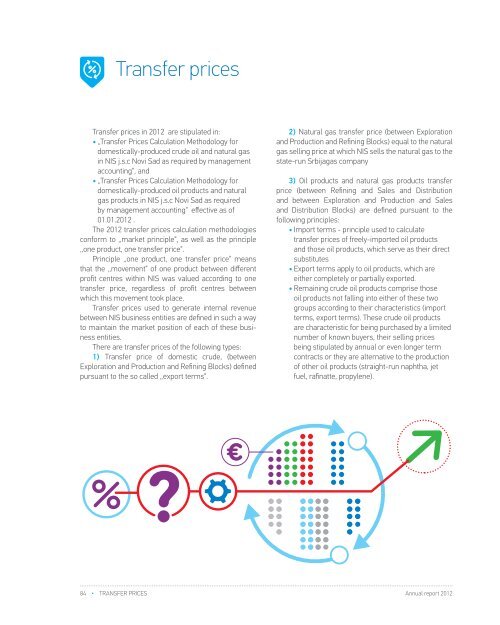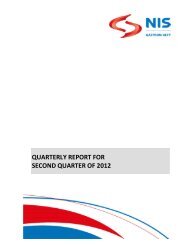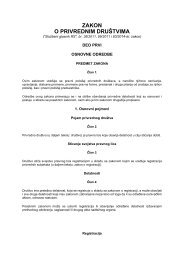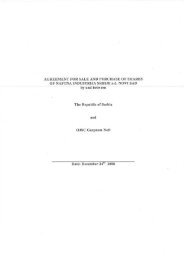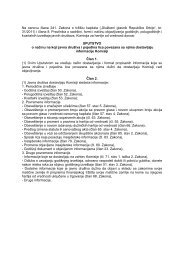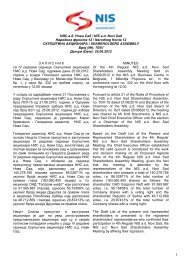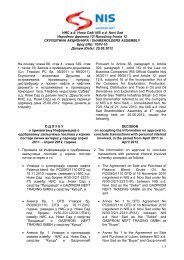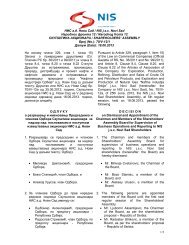FY 2012 - Investor Relations - NIS
FY 2012 - Investor Relations - NIS
FY 2012 - Investor Relations - NIS
Create successful ePaper yourself
Turn your PDF publications into a flip-book with our unique Google optimized e-Paper software.
Transfer pricesCases of uncertainty(uncertainty of collection)Transfer prices in <strong>2012</strong> are stipulated in:• „Transfer Prices Calculation Methodology fordomestically-produced crude oil and natural gasin <strong>NIS</strong> j.s.c Novi Sad as required by managementaccounting“, and• „Transfer Prices Calculation Methodology fordomestically-produced oil products and naturalgas products in <strong>NIS</strong> j.s.c Novi Sad as requiredby management accounting“ effective as of01.01.<strong>2012</strong> .The <strong>2012</strong> transfer prices calculation methodologiesconform to „market principle“, as well as the principle„one product, one transfer price“.Principle „one product, one transfer price“ meansthat the „movement“ of one product between differentprofit centres within <strong>NIS</strong> was valued according to onetransfer price, regardless of profit centres betweenwhich this movement took place.Transfer prices used to generate internal revenuebetween <strong>NIS</strong> business entities are defined in such a wayto maintain the market position of each of these businessentities.There are transfer prices of the following types:1) Transfer price of domestic crude, (betweenExploration and Production and Refining Blocks) definedpursuant to the so called „export terms“.?€2) Natural gas transfer price (between Explorationand Production and Refining Blocks) equal to the naturalgas selling price at which <strong>NIS</strong> sells the natural gas to thestate-run Srbijagas company3) Oil products and natural gas products transferprice (between Refining and Sales and Distributionand between Exploration and Production and Salesand Distribution Blocks) are defined pursuant to thefollowing principles:• Import terms - principle used to calculatetransfer prices of freely-imported oil productsand those oil products, which serve as their directsubstitutes• Export terms apply to oil products, which areeither completely or partially exported.• Remaining crude oil products comprise thoseoil products not falling into either of these twogroups according to their characteristics (importterms, export terms). These crude oil productsare characteristic for being purchased by a limitednumber of known buyers, their selling pricesbeing stipulated by annual or even longer termcontracts or they are alternative to the productionof other oil products (straight-run naphtha, jetfuel, rafinatte, propylene).As a part of the financial reports, the <strong>NIS</strong> j.s.c. NoviSad management makes accounting estimates and assumptionsrelated to the future. As a rule, the resultingestimations will hardly correspond to the accomplishedresults. The most significant estimations and assumptionsare the estimated provisions for decrease in valueof trade receivables, provisions for expected effects ofnegative litigation outcomes as well as provisions forenvironment protection.Trade receivables are initially recognized as per theirfair value. Provisions for decrease in value of receivablesare determined when based on objective evidence theCompany will not be able to collect all the receivables inaccordance with the original terms.For the first-class clients (clients representing 80%of total receivables by the total amount as at balancesheet date), receivables collectability risk is evaluatedtaking into consideration indicators of decrease in receivables’purchase value including as follows: receivables’age structure, estimated client debt collectabilityin accordance with his financial capabilities and existinghistory of late payments. In accordance with the previouslystated, provisions for decrease in value of receivablesare made and/or corrections of provisions chargedto the expense of the relevant period.For the second-class clients (clients representing20% of total receivables by the total amount as at balancesheet date), receivables collectability risk is evaluatedtaking into consideration late payments thus correctionsof provisions for these clients are made if thepayment is not settled within sixty (60) days as of thematurity date and/or date of foreign currency influx inthe country and/or within ninety (90) days as of the receivablesmaturity date for liquefied petroleum gas, deliveredgoods/energy to domestic consumers in the category«remote heating systems» (heating plants), tradereceivables-clients financed from the budget (army, police,health service, educational service, railroads etc.).The book value of receivables is decreased throughprovisions while the decreased value is recorded in theprofit and loss account within the position ‘other expenses’.When a receivable cannot be collected, it is writtenoff and charged to the provisions for receivables. As atDecember 31st <strong>2012</strong>, the Company made provisions forapproximately 46% of gross value of total receivables.The Company management evaluated and madeprovisions for environment protection as at balancesheet date in the amount of RSD 861.383 RSD based oninternal evaluation on the Company’s compliance withthe legislation of the Republic of Serbia. The managementbelieves that, based on the existing legislation,expenses related to environmental protection are notsignificantly higher compared to the provisions made.However, the stated expenses could significantly increasein the future period in case the legislation becomesmore restrictive.As at December 31st <strong>2012</strong>, the Company made provisionsfor potential loss which could emerge from taxliabilities evaluation by the Ministry of Finances of Angolato which the Company is to pay the difference intax assessment including interest in the amount of 80million USD related to additional profit oil for the periodfrom 2002 to 2007. The management believes that,based on the terms set forth in the concession contractswith Angola and the opinions of legal consultants fromAngola, such a request is not in accordance with thevalid legal framework in Angola due to the fact that thegovernment did not make correct oil profit calculationsand that oil profit is a contractual obligation towards thenational concessionaire which is opposite to the opinionof the Ministry of Finances of Angola. The managementwill file a complaint against any action of enforced taxcollection by the Ministry of Finances of Angola and takeall the necessary steps in order to postpone the collectionof tax until the court in Angola reaches a final decisionregarding the issue. Based on the experience ofother concessionaires, the court in Angola has not yetreached a decision related to their complaints againstthe decision of the Ministry of Finances even thoughthe complaints were filed three years ago. Taking all thepreviously stated into consideration, the Company managementbelieves that as at December 31st <strong>2012</strong>, thereis a significant level of uncertainty as regards the timerequired to settle the request of the Ministry of Financesof Angola and the amount of additional tax on profit oil,if any.84 • Transfer prices Annual report <strong>2012</strong>Annual report <strong>2012</strong>Cases of uncertainty • 85


